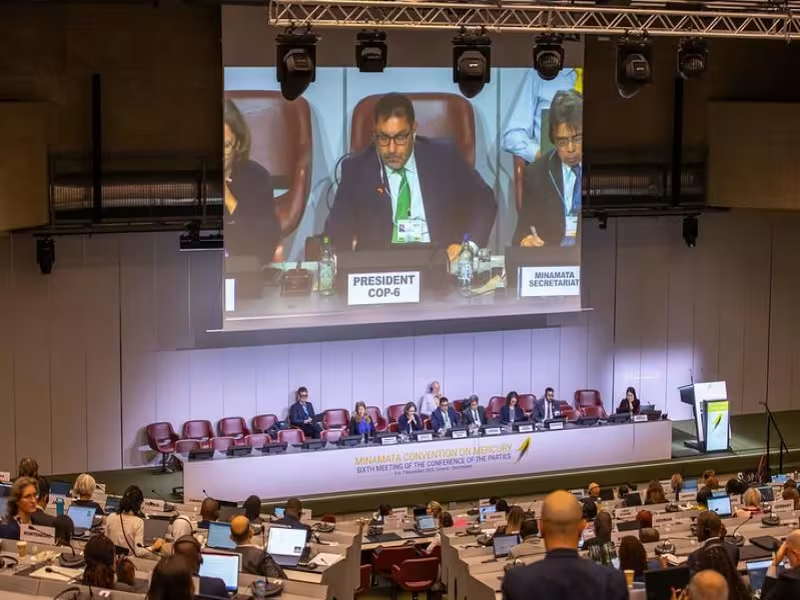
SHERIDAN, WYOMING - November 10, 2025 - A pivotal decision at the Sixth Conference of the Parties (COP6) to the Minamata Convention on Mercury has extended the global phase-out date for dental amalgam from 2030 to 2034. The outcome represents a major win for oral and public health, driven by coordinated advocacy from the FDI World Dental Federation (FDI) and the International Association for Dental, Oral, and Craniofacial Research (IADR).
A Milestone for Equity and Patient-Centered Care
The new COP6 agreement establishes that the manufacture, import, and export of dental amalgam will cease globally by 2034. Crucially, it includes an exemption permitting its use "when its use is considered necessary by the dental practitioner based on the needs of the patient." This ensures clinicians can continue providing essential restorative care in cases where alternatives remain inaccessible or unsuitable-especially in low-resource settings.
This balanced outcome underscores the importance of a patient-centered approach in global health policymaking. It also validates the collaborative advocacy efforts of international dental associations, which have long argued that environmental goals must not compromise access to safe and effective dental care.
Science-Based Advocacy Shapes Policy
FDI and IADR, supported by the International Dental Manufacturers Association (IDM) and the American Dental Association (ADA), played a decisive role throughout the COP6 negotiations. Their unified advocacy emphasized that while phasing down mercury use is vital, it must be achieved through an equitable, evidence-based transition that considers the differing capacities of national healthcare systems.
"As we move toward the eventual phase-out of dental amalgam, it is essential that the needs of our members, and the patients they serve, remain at the heart of every decision," said Mr Enzo Bondioni, Executive Director of FDI. "This outcome provides much-needed time and clarity for our members to plan, prepare, and implement the necessary national policies. It reinforces FDI's commitment to supporting the global dental community in maintaining continuity of care and advancing oral health equity during this important transition."
Extending the Transition Timeline to 2034
Through persistent engagement, FDI and IADR successfully secured an extension of the proposed 2030 deadline to 2034. The additional four years give countries greater flexibility to phase down amalgam use responsibly, strengthen waste management systems, and develop effective mercury-free alternatives.
During four days of discussions, both organizations reiterated that prevention and research remain central to the global transition. They called for further innovation into affordable and durable materials that meet clinical performance standards while supporting environmental sustainability.
Research and Innovation Drive the Future of Restorative Dentistry
"Science and evidence must remain at the heart of every global health policy decision," said Dr Christopher Fox, Chief Executive Officer of IADR. "This outcome reflects the progress we've made by investing in research into mercury-free alternatives, as called for in the text of the Minamata Convention, from both the public and private sectors. IADR remains committed to supporting continued innovation and research that will further the rapid improvement of affordable, effective, and sustainable restorative materials, so no one is left behind in this transition."
This joint stance highlights the need for partnerships between academia, industry, and regulators to accelerate the adoption of new materials that preserve patient safety and clinical outcomes. The decision also positions dentistry as a leader in sustainable healthcare transformation under the Minamata Convention's global framework.
Supporting Global Implementation and Oral Health Equity
Parties to the Convention now have nine years to adapt their national strategies and healthcare systems to align with the 2034 framework. For many developing nations, this transition window will be critical for capacity-building, clinician training, and ensuring patient access to restorative care.
By coupling a clear global target with flexibility for practitioners, the COP6 decision helps prevent disparities between high- and low-income regions. It reflects a growing recognition that environmental policies must integrate health equity at their core.
Looking Ahead to COP7 and Beyond
As the Minamata Convention marks its tenth anniversary in 2027, the next Conference of the Parties (COP7) will review progress toward the 2034 phase-out goal. FDI and IADR plan to continue their leadership in shaping global oral health policy, advocating for sustainable, evidence-driven solutions that advance both environmental and patient well-being.
For more information on the Minamata Convention and FDI's global advocacy initiatives, visit fdiworlddental.org.